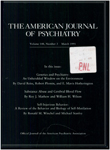Informed consent and tardive dyskinesia
Abstract
To determine whether a formalized informing process transmitted knowledge concerning the risks and benefits of neuroleptic medication, particularly the risk of tardive dyskinesia, to stable schizophrenic outpatients, the authors administered a multiple-choice questionnaire to 21 patients who were read a standardized information form and 27 patients who were not. The mean scores for the informed patients were significantly higher, and the differences between the two groups remained significant at 6-month follow-up. The information process had no adverse effects on frequency of psychiatric admission, noncompliance with medication, or the need for increased antipsychotic medication.
Access content
To read the fulltext, please use one of the options below to sign in or purchase access.- Personal login
- Institutional Login
- Sign in via OpenAthens
- Register for access
-
Please login/register if you wish to pair your device and check access availability.
Not a subscriber?
PsychiatryOnline subscription options offer access to the DSM-5 library, books, journals, CME, and patient resources. This all-in-one virtual library provides psychiatrists and mental health professionals with key resources for diagnosis, treatment, research, and professional development.
Need more help? PsychiatryOnline Customer Service may be reached by emailing [email protected] or by calling 800-368-5777 (in the U.S.) or 703-907-7322 (outside the U.S.).



